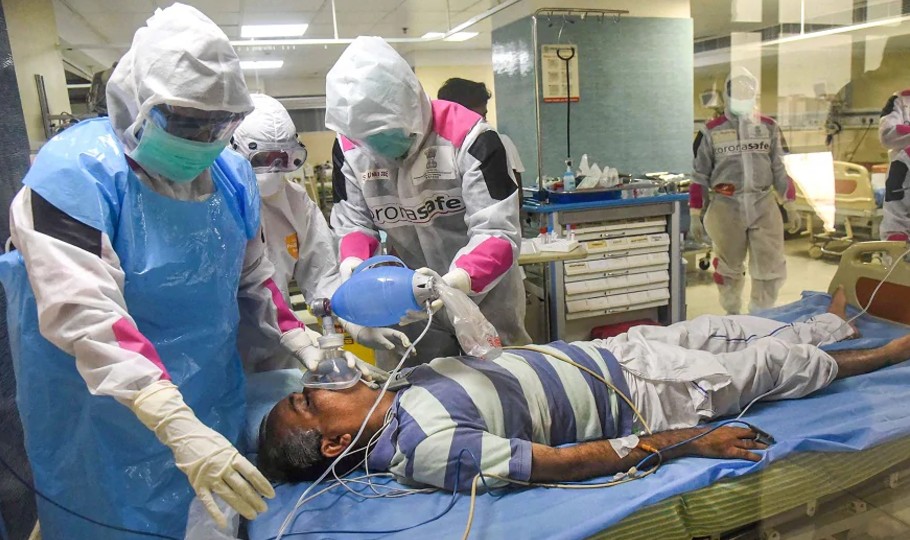
Natural COVID-19 infection lowers risk of hospitalisation, death by 88%: Lancet study

The risk of hospitalisation or death is 88 per cent lower for at least 10 months for someone with a history of COVID-19 infection than one who was not infected earlier, a study published in The Lancet has said.
The systematic review and meta-analysis included 65 studies from 19 countries including India and evaluated the effectiveness of past infection by outcome (infection, symptomatic disease, and severe disease), variant, and time since infection, the study said.
Also read: Chest CT scans reveal lung abnormalities in patients 2 years after COVID
The analyses excluded studies examining natural immunity in combination with vaccination, termed as hybrid immunity.
Analysis of data from 21 studies reporting on time since infection from a pre-Omicron variant estimated that protection against reinfection from a pre-Omicron variant was about 85 per cent at one month – and this fell to about 79 per cent at 10 months, it said.
Protection from a pre-Omicron variant infection against reinfection from the Omicron BA.1 variant was lower, 74 per cent at one month, and declined more rapidly to 36 per cent at around 10 months, the study said.
Protection against Alpha, Delta variants lasts the most
Nevertheless, analysis of five studies reporting on severe disease (hospitalisation and death) found that protection remained universally high for 10 months – 90 per cent for ancestral, Alpha, and Delta, and 88 per cent for Omicron BA.1, the study said.
Six studies evaluating protection against Omicron sub-lineages specifically, BA.2 and BA.4/BA.5, suggested significantly reduced protection when the prior infection was pre-Omicron variant, the study said.
But when the past infection was Omicron, protection was maintained at a higher level.
“The weaker cross-variant immunity with the Omicron variant and its sub-lineages reflects the mutations they have that make them escape built-up immunity more easily than other variants,” said co-author Hasan Nassereldine from the Institute for Health Metrics and Evaluation (IHME) at the University of Washington’s School of Medicine, US.
Also read: Organ damage persists in almost 60 pc of long Covid patients: Study
“The limited data we have on natural immunity protection from the Omicron variant and its sub-lineages underscores the importance of continued assessment, particularly since they are estimated to have infected 46 per cent of the global population between November 2021 and June 2022.”
“Further research is also needed to assess the natural immunity of emerging variants and to examine the protection provided by combinations of vaccination and natural infection,” said Nassereldine.
The study did not include data on infection from Omicron XBB and its sublineages, it said.
‘Level of protection on par with mRNA vaccine doses’
Since January 2021, several studies and reviews have reported the effectiveness of past COVID-19 infection in reducing the risk of reinfection and how immunity wanes over time.
But none has comprehensively assessed how long the protection after natural infection will last and how durable that protection will be against different variants, the study said.
To provide more evidence, the researchers conducted a review and meta-analysis of all previous studies that compared the reduction in risk of COVID-19 among non-vaccinated individuals against a SARS-CoV-2 reinfection to non-vaccinated individuals without a previous infection up to September 2022, the study said.
The study also suggested that the level and duration of protection against reinfection, symptomatic disease and severe illness is at least on a par with that provided by two doses of the mRNA vaccines (Moderna, Pfizer-BioNtech) for ancestral, Alpha, Delta and Omicron BA.1 variants.
The study’s lead author Stephen Lim, IHME, said that while vaccination is the safest way to acquire immunity, acquiring natural immunity must be weighed against the risks of severe illness and death associated with the initial infection.
Also read: Researchers identify two prominent symptoms of long COVID
“Vaccines continue to be important for everyone in order to protect high-risk populations such as those who are over 60 years of age and those with comorbidities. This also includes populations that have not previously been infected and unvaccinated groups, as well as those who were infected or received their last vaccine dose more than six months ago. Decision-makers should take both natural immunity and vaccination status into consideration to obtain a full picture of an individual’s immunity profile,” co-author Caroline Stein, IHME, said.
The researchers noted some limitations of their study, cautioning that the number of studies examining the Omicron BA.1 variant and its sub-lineages and the number from Africa was generally limited.
Also, only limited data were available beyond 10 months after the initial infection. They also noted that some information, such as past infection status and hospital admissions, was measured differently or incomplete, and could bias the estimate of protection.
(With inputs from agencies)


